The average cost of Chemotherapy in Bangkok approximately ranges between USD 2510/Session to USD 3130/Session
Treatment cost
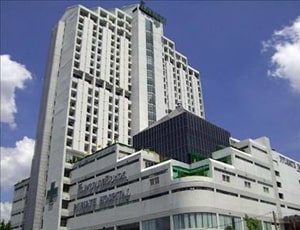
Types of Chemotherapy in Piyavate Hospital and its associated cost
| Treatment Option | Approximate Cost Range (USD) | Approximate Cost Range (THB) |
|---|---|---|
| Chemotherapy (Overall) | 566 - 3402 | 19730 - 120434 |
| Standard Chemotherapy | 563 - 1715 | 20255 - 61046 |
| Targeted Therapy | 1101 - 2045 | 40264 - 71238 |
| Immunotherapy | 1693 - 2844 | 60076 - 99391 |
| Hormone Therapy | 681 - 1124 | 23859 - 40655 |
| Intrathecal Chemotherapy | 344 - 798 | 11983 - 27492 |
| Intra-arterial (IA) Chemotherapy | 558 - 1367 | 19842 - 48489 |
SPECIALITIES
FACILITIES & AMENITIES
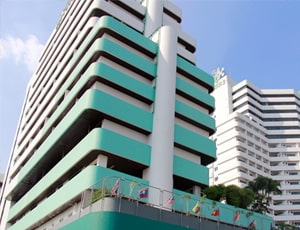
Types of Chemotherapy in Phyathai 2 International Hospital and its associated cost
| Treatment Option | Approximate Cost Range (USD) | Approximate Cost Range (THB) |
|---|---|---|
| Chemotherapy (Overall) | 561 - 3426 | 20191 - 122037 |
| Standard Chemotherapy | 551 - 1713 | 19927 - 60883 |
| Targeted Therapy | 1111 - 1983 | 39348 - 72880 |
| Immunotherapy | 1714 - 2771 | 60857 - 101794 |
| Hormone Therapy | 681 - 1150 | 24236 - 39497 |
| Intrathecal Chemotherapy | 335 - 788 | 11827 - 28625 |
| Intra-arterial (IA) Chemotherapy | 564 - 1370 | 19764 - 47062 |
DOCTORS IN 11 SPECIALITIES
FACILITIES & AMENITIES
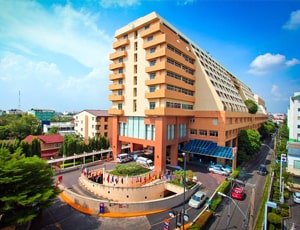
Types of Chemotherapy in Vejthani Hospital and its associated cost
| Treatment Option | Approximate Cost Range (USD) | Approximate Cost Range (THB) |
|---|---|---|
| Chemotherapy (Overall) | 553 - 3360 | 19900 - 122390 |
| Standard Chemotherapy | 550 - 1657 | 20289 - 59671 |
| Targeted Therapy | 1141 - 2065 | 40582 - 72076 |
| Immunotherapy | 1675 - 2840 | 59052 - 102037 |
| Hormone Therapy | 681 - 1106 | 23636 - 39455 |
| Intrathecal Chemotherapy | 343 - 801 | 12015 - 27641 |
| Intra-arterial (IA) Chemotherapy | 557 - 1331 | 20223 - 48321 |
DOCTORS IN 13 SPECIALITIES
FACILITIES & AMENITIES

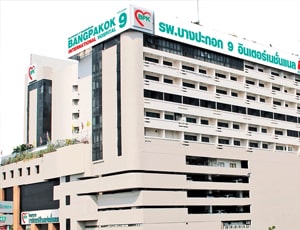
Types of Chemotherapy in Bangpakok 9 International Hospital and its associated cost
| Treatment Option | Approximate Cost Range (USD) | Approximate Cost Range (THB) |
|---|---|---|
| Chemotherapy (Overall) | 557 - 3355 | 20316 - 118223 |
| Standard Chemotherapy | 557 - 1703 | 20062 - 58855 |
| Targeted Therapy | 1120 - 2045 | 40914 - 70675 |
| Immunotherapy | 1661 - 2874 | 61413 - 102051 |
| Hormone Therapy | 667 - 1107 | 24557 - 40930 |
| Intrathecal Chemotherapy | 331 - 773 | 12054 - 28428 |
| Intra-arterial (IA) Chemotherapy | 566 - 1335 | 20079 - 49092 |
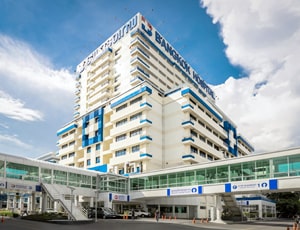
Types of Chemotherapy in Bangkok Hospital and its associated cost
| Treatment Option | Approximate Cost Range (USD) | Approximate Cost Range (THB) |
|---|---|---|
| Chemotherapy (Overall) | 566 - 3392 | 20317 - 120147 |
| Standard Chemotherapy | 574 - 1718 | 20474 - 61138 |
| Targeted Therapy | 1134 - 2003 | 39667 - 71698 |
| Immunotherapy | 1679 - 2860 | 59231 - 101115 |
| Hormone Therapy | 670 - 1126 | 24150 - 40769 |
| Intrathecal Chemotherapy | 339 - 770 | 11876 - 28290 |
| Intra-arterial (IA) Chemotherapy | 567 - 1369 | 19757 - 47777 |
DOCTORS IN 13 SPECIALITIES
FACILITIES & AMENITIES
Chemotherapy is a category of standardized drug administration of various types for the treatment of cancer. With a curative intent, some combinations of drugs are administered to a patient to prolong their life and also to bring about a reduction in the symptoms shown by the patient. Chemotherapy treatment is considered to be one of the major categories of medical oncology. Many people around the world are prescribed to undergo chemotherapy treatment instead of undergoing a surgical procedure. But many are frightened with the side effects of this treatment as it is believed to reduce the quality of life of the patients.
Chemotherapy is a procedure where non-specific intracellular poisons are used, which are specifically related to preventing the process of mitosis or the natural cell division of the cancerous cells. This technique rather excludes those agents that are responsible for selective extracellular growth signal blockade (signal transduction blockers). If spoken about these agents used in chemotherapy, it has been found that most of them are cytotoxic in nature due to their property of interfering with natural mitosis. However, the cells of cancer can differ widely in terms of showing susceptibility to these administered agents.
Chemotherapy can be defined as a way of mass destruction of stress cells, which would eventually lead to the death of the cells when apoptosis is initiated. The commonly known side effects of chemotherapy can be traced back to the process of damaging normal non-cancerous cells, which are in the process of rapid division. They are sensitive to anti-mitotic drugs that are being administered to the patient and such cells may include the cells of the hair follicles, digestive tract lining, and bone marrow. But nowadays treatment options have undergone a lot of modification by which these side effects can be well countered.
Various options of drugs are available to treat different types of cancer including the following:
Alkylating agents: These kinds of agents prove to be extremely beneficial during the cell’s resting phase. The various kinds of alkylating agents that are employed in chemotherapy treatment include the following:
Nitrosoureas are unique from the rest for choices in chemotherapy treatment due to their ability to cross the blood-brain barrier and treating tumors of the brain.
Plant alkaloids: Plant alkaloids employed for chemotherapy treatment are derived from plants. These include vinca alkaloids, taxanes, podophyllotoxins, and camptothecan analogs. The plant alkaloids are cell cycle specific agents, which enables them to attack the dividing cells in various stages of their division cycle.
Antimetabolites: This kind of chemotherapy treatment involves substances that are similar in composition to the normal substances present in the cell. When these substances get incorporated in the process of cellular metabolism, then the cell is no longer able to divide. They are also cell cycle specific and can be classified further according to the substance in the cell with which they interfere.
Topoisomerase inhibitors: When the topoisomerase enzymes in the body ( topoisomerase I and II) are inhibited as a result of chemotherapy drugs, then those drugs are referred to as topoisomerase inhibitors. During the chemotherapy, the topoisomerase enzymes are responsible for controlling structural manipulation of the DNA which is necessary for the purpose of replication.
Miscellaneous antineoplastics: Different types of drugs make each chemotherapy treatment process unique. Enzymes, retinoids, adrenocortical steroid inhibitor, ribonucleotide reductase inhibitor or antimicrotubule agents can be used as chemotherapy drugs.
Some of the chemotherapy drugs are involved in damaging the cell at the time of splitting while others do their jobs when the gene copies are being made by the cell prior to division. The cells that are in resting phase are very less likely to get damaged. Different kind of drugs damage the cells at different stages and hence a combination of various drugs will increase the chance of damaging more number of cancer cells.
Chemotherapy drugs can be given in a variety of ways. At times due to the destructive nature of stomach enzymes, some of the drugs are impossible to administer as pills. While for other drugs the effects are better realized when administered intravenously. Some of them can be injected into muscles while other can be given directly to the abdominal cavity and bladder directly.
They are administered orally and are available in various forms such as liquids, tablets, capsules, and pill. All these forms can be absorbed by the stomach or under the tongue. The protective coating around them is broken down by digestive juices of the stomach and then the medication is directly absorbed by the lining of the stomach. There are some which have a certain amount of time delay between the administration and the actual release of the medicine.
With the help of a short needle, the drug is administered into the region between the muscle and skin but it does not penetrate as far as the layer of muscles. They are used for some biologic response modifiers and support drugs of chemotherapy. If the platelet count of the patient is low, then it is less likely that such injections can cause any bleeding more than that in case if it was an intra muscular injection.
In this case, the injection penetrates the muscle layer and a large needle has to be used for this so that the medication gets deposited in the tissues of the muscle. Most chemotherapy cannot be implemented via intramuscular injection owing to its harshness. People with low platelet counts are not advised with this due to the possibility of bleeding within the muscle.
This also gets absorbed rapidly in the circulation system in the body. It offers more flexibility, thus making it more common. Continuous infusions are ensured through this method for days and weeks if required. Some of the types of intravenous infusions include the following:
In this procedure, the drugs are meant to reach the cerebrospinal fluid. The blood-brain barrier stops many drugs to reach it and hence in two ways it can be done; one is the lumbar puncture and the other is Ommaya reservoir. A dome-shaped device with a catheter attached is placed in the subcutaneous layer on the scalp. It is threaded to the lateral ventricle of the brain. A small needle is placed through the ommaya reservoir to inject drugs. This is good for chemotherapy for leukemia.
In this case, the drug can be directly drained into the abdominal cavity, the general cavity surrounding the organs. The organs, as a result, get bathed in the medication before it gets absorbed into the tumor site.
Here the drug is given directly to the artery supplying blood to a tumor. This kind of treatment is beneficial for colon cancer, limb melanoma, pancreatic cancer, gastric cancer, and some other forms of cancer.
A urinary catheter is used to access the urinary bladder and useful for people suffering from superficially invasive bladder cancer.
This is the chemotherapy for lung cancer where the drug is administered in the pleural cavity to control malignant pleural effusions and used for symptom relief.
A gliadel wafer can be placed in the cavity after removal of tumor in the brain. It can be left for 2 or 3 weeks to ensure that all cancer cells are finally killed in the area surrounding the brain tumor site.
In this case, a cream is applied to the skin and used to treat cancerous lesions on the skin itself. Not used very commonly but used for treating skin cancer.
Ask your healthcare adviser for the best multiple options and choose the one that meets your expectations
$2500 is the starting cost of Chemotherapy Surgery in Bangkok. While there are wide range of hospitals offering Chemotherapyation, international patients should always seek JCI-Certified Hospitals in Bangkok for the best results.
Chemotherapy package cost in Bangkok has different inclusions and exclusions. There are many hospital who cover the cost of pre-surgical investigations of the patient in the treatment package. The treatment cost usually includes the expenses related to hospitalization, surgery, nursing, medicines, and anesthesia. There are many things that may increase the cost of Chemotherapy in Bangkok, including prolonged hospital stay and complications after the procedure.
Chemotherapy in Bangkok is offered by multiple hospitals across the country. Some of the most renowned hospitals for Chemotherapy in Bangkok include the following:
While the speed of recovery may vary from patient to patient, they are still required to stay for about 20 days after discharge. This period is important to conduct all the follow-up tests to ensure that the surgery was successful and the patient can go back to the home country.
Apart from the Chemotherapy cost, there are a few other daily charges that the patient may have to pay. These are the chanrges for daily meals and hotel stay outside the hospital. The extra charges may vary from 25 USD.
The patient is supposed to stay at the hospital for about 1 Days after Chemotherapy surgery for monitoring and care. During the recovery, the patient is carefully monitored and control tests are performed to see that everything is okay. If required, physiotherapy sessions are also planned during recovery in hospital.
Out of all the hospitals in Bangkok, there are about 5 Hospitals best hospitals for Chemotherapy in Bangkok. These hospitals have the required expertise as well as infrastructure available to handly patients who need Chemotherapy. Also, these hospitals follow the necessary guidelines as required by the medical associations for the treatment of Chemotherapy patients.
Some of the most sought after doctors for Chemotherapy in Bangkok are:
Some of the top hospitals in Bangkok for Chemotherapy and their associated prices:
| Hospital | Minimum Cost | Maximum Cost |
|---|---|---|
| Phyathai 2 International Hospital, Bangkok | USD 2670/Session | USD 3120/Session |
| Vejthani Hospital, Bangkok | USD 2680/Session | USD 3240/Session |
| Bangkok Hospital, Bangkok | USD 2600/Session | USD 3200/Session |
| Piyavate Hospital, Bangkok | USD 2510/Session | USD 3130/Session |
Bangkok in Thailand is a sought-after destination for medical tourism. On average, around 2.5 million international patients visit Thailand every year, mostly to Bangkok to avail healthcare services. The number of medical tourists visiting Bangkok continues to rise because of the affordable and advanced treatments available in the city. Bangkok is renowned for its high standard of medical technology and globally trained doctors. In Bangkok, patients can expect to save about 50-70% of the cost when compared to countries like Australia and US. In addition to competitive prices, hospitals in Bangkok offer shorter waiting times to international patients. Over 20 hospitals in Bangkok have received accreditation from the Joint Commission International (JCI) for setting benchmarks in healthcare. The hospitals in Bangkok also have a long-standing tradition of focusing on patient-centric care. They provide interpretation services in various languages so that patients can communicate effectively with their doctors.
Bangkok offers technologically advanced hospitals that are well-furnished to take care of all the healthcare needs of the patients. Some of the top hospitals in Bangkok are:
Bangkok has a pool of skilled and qualified doctors who have completed training at some of the most prestigious institutes across the world. Some of the top doctors in Bangkok are:
Bangkok has excellent connectivity with the rest of the world by air. There are two airports in Bangkok: Suvarnabhumi, which is 25 kilometers to the east, and Don Mueang, which is 24 kilometers to the north of Bangkok. You can take a flight from your city to these airports and then travel to downtown Bangkok by bus or train. In case you wish to avail treatment here, we can assist you in planning your medical travel.